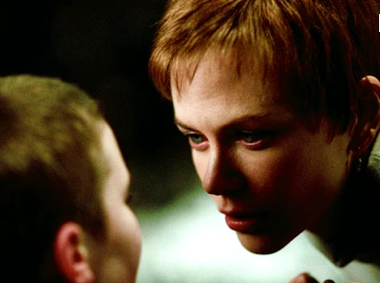To honor the passing of the great songwriter Hugh Martin Friday at 96 years of age, a repost of a review of one of my 100 favorite movies, a member of my personal canon. (If you joined us after 2008 you can pretend it's a new essay!) Imagine giving the world such perfectly crafted enduring gifts as "Have Yourself a Merry Little Christmas" and "The Trolley Song". R.I.P. Mr. Martin.
Meet Me in St. Louis "The Blossoming of Judy Garland"

Meet Me in St. Louis (1944)
Directed by Vincente Minnelli; Written by Irving Brecher and Fred F Finklehoffe from the novel "5135 Kensington" by Sally Benson; Starring Judy Garland, Mary Astor, Leon Ames, Margaret O'Brien, Lucille Bremer, Harry Davenport, June Lockhart, Tom Drake and Marjorie Main; Production & Distributor Metro-Goldwyn-Mayer (MGM); Released 11/28/1944
It's Summer 1903 in Missouri and the Smith family are buzzing about the World's Fair coming to their town the following spring. Teenage daughters Rose (Lucille Bremer) and Esther (Judy Garland) are dreaming about proposals from handsome men, the eldest son Lonnie (Henry H Daniels Jr) is off to college and the father Lon (Leon Ames), a junior partner at a law firm, is about to tell the family that they're all relocating to New York Ci -- oh, but let's stop there. For any plot summary of Meet Me in St. Louis does the movie a great disservice. This classic musical isn't plot driven at all so much as a series of three seasonal vignettes of family life: Summer, Autumn and Winter with the following Spring in 1904 serving as a coda. Almost all of what might be called "plot" in Meet Me In St. Louis is imagined. That is to say, that the story drivers are all in the future. One day the family will move to New York. One day Rose, Lonnie, and Esther will be married. One day St. Louis will catch the attention of the nation. In essence the movie is a lovingly rendered still life of a family (and town) on the brink of great changes rather than an animated portrait of the changes themselves.
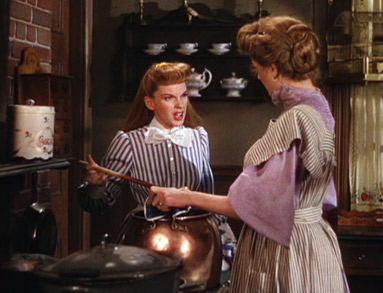 St. Louis begins smartly in the kitchen, the heart of any home. Mrs. Anna Smith (Mary Astor) and her maid and cook Katie (Marjorie Main) are preparing ketchup. Katie thinks it's too sweet, Anna thinks her husband will like it that way. Various members of the cast scoot through the kitchen sharing their opinions, too. They can't seem to agree on the flavor: too sweet? too sour? too spicy? too watery? Vincente Minnelli the real gourmet cook in the director's chair doesn't have the same problem. He gets everything right.
St. Louis begins smartly in the kitchen, the heart of any home. Mrs. Anna Smith (Mary Astor) and her maid and cook Katie (Marjorie Main) are preparing ketchup. Katie thinks it's too sweet, Anna thinks her husband will like it that way. Various members of the cast scoot through the kitchen sharing their opinions, too. They can't seem to agree on the flavor: too sweet? too sour? too spicy? too watery? Vincente Minnelli the real gourmet cook in the director's chair doesn't have the same problem. He gets everything right.
If the director was nervous about handling his first big budget color feature with a bonafide superstar in the lead role, you'd never know it from the results. Minnelli had only directed two black and white pictures (Cabin in the Sky, see previous article, and I Dood It both in 1943) prior to this big break but Meet Me In St Louis moves with such easy confidence, gently in and out of song and book scenes, you'd think he had nothing at all to prove.
Take the terrific economy and pacing --the movie is at once both leisurely and jam packed with comic, musical and dramatic beats -- of the final two scenes that conclude the first and longest act in the movie (Summer 1903). First there's a lengthy party sequence at the Smith home wherein Esther comically tries to seduce "The Boy Next Door" John Pruett (Tom Drake). She's endearingly amateur at seduction though Judy Garland is of course anything but amateurish when it comes to ingratiating herself to the viewer. John accompanies her through her house as she turns off the lights. It's ostensibly her duty but she's makes a huge drawn out production of it -- she's only doing it to set the mood for their first kiss. The amusement of the scene is that Esther doesn't realize she's succeeding and misreads John's nerves and equally adolescent flirting. When he finally hightails it out of her house without the kiss she's been longing for she flips the lights back on, at once. It's a great deflating punchline. The follow up scene, the classic Trolley sequence, repeats the punchline.
Buzz, buzz, buzz went the buzzer
Plop, plop, plop went the wheels
Stop, stop, stop went my heartstrings
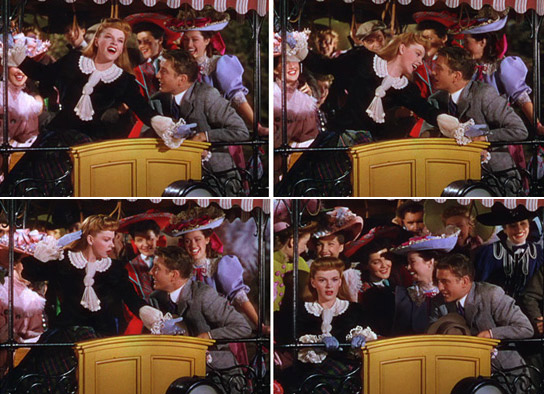
As he started to leave, I took hold of his sleeve with my hand
And as if it were planned... he stayed on with me
And it was grand just to stand with his hand holding mine
To the end of the line.
Esther is obviously singing/dreaming about John but hasn't noticed his arrival beside her for the last chorus. On her last joyous note she turns to finds the object of her affections staring her in the face. It totally throws her. Oops! Once again she's more comfortable in the dream than in the reality. It's the perfect performance note to hit for this girl who is not quite yet a woman.
Speaking of which...
Judy Garland was 22 years old when St. Louis hit theaters. She was already a screen sensation with multiple Mickey Rooney hits and The Wizard of Oz behind her. According to reports she was hesitant to take this role, another teenage character, since she had wanted to move into more grown up roles. Esther Smith turned out to be just what she was after all along. The answer was right in front of her. (There's no place like home and all that).
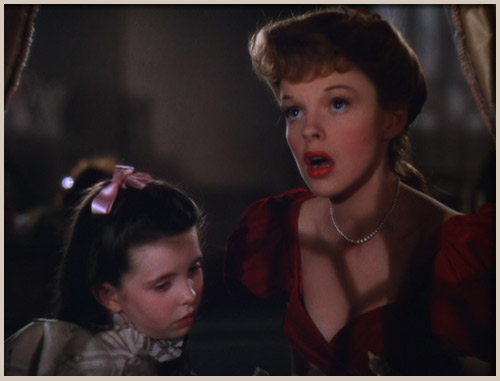
Esther Smith proved the perfect bridge role for one of the greatest stars of all time, taking Garland from teenager to woman both onscreen and off. By the third act (Winter 1903) Esther and John are in the thrall of requited love and faced with rather adult choices about their futures. By the time Esther is singing "Have Yourself a Merry Little Christmas" to her young sister Tootie (Margaret O'Brien), Judy Garland is a grown woman in full bloom and the camera treats her accordingly. By the time the film was released, Garland and Minnelli were in love and living together. It all came together gloriously. Arguably Meet Me in St. Louis (1944) is the emblematic peak of Garland's film career between her 'star is born' role in The Wizard of Oz (1939) to, well, A Star is Born (1954) itself.
But all this talk of Judy's blossoming (she was never lovelier onscreen), changing seasons, loving families and screen romances also does a disservice to the spicy flavors within this musical. While it is a sweet nostalgic slice of Americana, it never descends into mere treacly pablum. The Fall 1903 segment adds enough sour to the soup, focusing on the sometimes gruesome antics and morbid imaginations of Esther's young sisters Agnes (Joan Carroll) and particularly Tootie played by child star Margaret O'Brien who received a juvenile Academy Award for her performance --just like her co-star had in The Wizard of Oz. And the delicate balance of flavors continues all through The Winter 1903 segment when Rose and Esther behave badly at a local dance. One particular bit has Esther putting on her first corset. Rather than play up the beauty of her figure, Minnelli and Garland opt to spike the scene with laughs and physical comedy.
I feel elegant but I can't breathe.
Furthermore, the sweetness of Esther and John's romance is tempered with their very un movie-like (if barely acknowledged) realization that they're moving too quickly. The movie never settles for just one flavor. In short, it's delicious. Or, to quote Esther herself, "heavenly... simply heavenly".
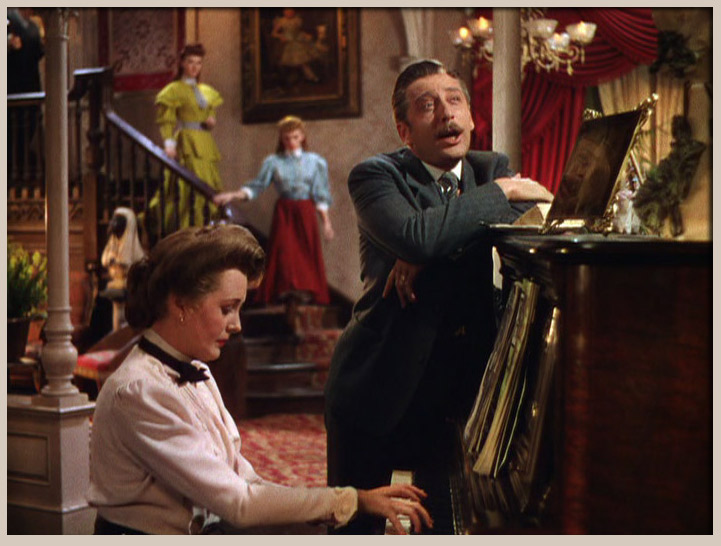
For all of the undoubtedly careful mix of moods and delicate character arcs that Minnelli stirs into his career-making hit, the most impressive thing might well be how effortless his achievement plays. With the semi resurgence of the film musical in the Aughts, much has been written about modern audiences hesistation to suspend their disbelief when characters burst into song. Modern musicals still feel a bit tentative, like they're scared to do at all what musicals are best at doing. Today's filmmakers would do well to study Meet Me In St. Louis which fills its central family's life with music: they hum, they sing phrases of songs even when no production number is on the way, they play piano; Music feels as natural here as it's ever felt in a movie. The space between musical performance and acting of the non-singing variety is blissfully blurred. In the Trolley Song sequence already discussed Judy spends the first verse of the song fretting. She's not singing at all, letting the crowd handle the number as she makes her way through the crowded car. By the time she's spotted her would be man running toward the car (He hadn't forgotten her invitation after all!) the sudden lift in her spirits is expressed quite naturally by her joining in... Everyone else is singing, why shouldn't she? There's another wonderful moment late in the film which I think best expresses Minnelli's graceful direction through performance, plot and song. Mr and Mrs Smith have had a row over the family's impending move to New York and their children have already exited the scene in anger. The mother and father begin to make peace at the piano. And as the father's voice lifts, the sisters are all gently coaxed back into frame, with unspoken forgiveness on their minds. It's a beautiful grace note in an altogether heavenly movie. A
 Monday, March 14, 2011 at 2:18PM
Monday, March 14, 2011 at 2:18PM  As part of Reader Appreciation Month, We're doing mini interviews with readers. Get to know other members of the Film Experience community!
As part of Reader Appreciation Month, We're doing mini interviews with readers. Get to know other members of the Film Experience community!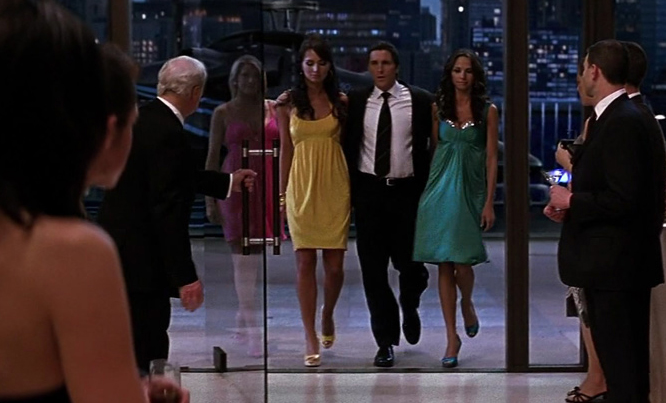 Christian Bale in "Scenes From BBats Life"
Christian Bale in "Scenes From BBats Life"












